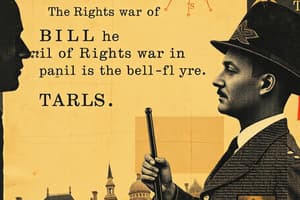Podcast
Questions and Answers
What laws were passed following the Civil War?
What laws were passed following the Civil War?
- Reconstruction Acts
- Voting Rights Act
- Black Codes (correct)
- Civil Rights Amendments
What were the Black Codes?
What were the Black Codes?
A series of statutes and laws enacted in 1865 and 1866 by the legislatures of the Southern states following the end of the Civil War.
What did the Black Codes restrict?
What did the Black Codes restrict?
The freedom of black people (freedmen) and their rights to own property, conduct business, buy and lease land, and move freely.
What was the purpose of the Black Codes?
What was the purpose of the Black Codes?
What requirements did Black Codes enforce?
What requirements did Black Codes enforce?
What are some examples of Black Codes?
What are some examples of Black Codes?
What is a White Primary?
What is a White Primary?
On what laws were most Black Codes based?
On what laws were most Black Codes based?
What was the first year a state implemented a poll tax?
What was the first year a state implemented a poll tax?
By what year did every state have a poll tax?
By what year did every state have a poll tax?
What is a literacy test?
What is a literacy test?
What is a Grandfather Clause?
What is a Grandfather Clause?
What is a poll tax?
What is a poll tax?
How did the Black Codes lead to a system of penalties?
How did the Black Codes lead to a system of penalties?
Who created the Black Codes?
Who created the Black Codes?
When was the first of the Black Codes passed?
When was the first of the Black Codes passed?
How did the Black Codes deny rights?
How did the Black Codes deny rights?
What were Labor Contracts under the Black Codes?
What were Labor Contracts under the Black Codes?
What pressure did Vagrancy Laws place on ex-slaves?
What pressure did Vagrancy Laws place on ex-slaves?
What powers did Vagrancy Laws grant to police?
What powers did Vagrancy Laws grant to police?
What defined a vagrant under the Black Codes?
What defined a vagrant under the Black Codes?
What differentiated crimes and punishments between freedmen and whites?
What differentiated crimes and punishments between freedmen and whites?
What was the Courts' role under the Black Codes?
What was the Courts' role under the Black Codes?
How did Congress respond to the Black Codes?
How did Congress respond to the Black Codes?
Flashcards are hidden until you start studying
Study Notes
Black Codes Overview
- Black Codes were enacted in 1865 and 1866 in Southern states following the Civil War.
- Aimed to restrict civil rights of freedmen and re-establish control over the freed slave population.
Restrictions Imposed
- Limited freedoms of freedmen: property ownership, business conduct, and movement in public spaces.
- Encouraged segregation and maintained white supremacy in Southern society.
Purpose of Black Codes
- Intend to regain control over freed slaves and inhibit their freedoms.
- Prevent black uprisings and ensure a supply of cheap labor for Southern economies.
Enforcement Mechanisms
- Requirements such as poll taxes, property qualifications, and literacy tests were instituted to limit voting rights.
- Vagrancy laws required ex-slaves to prove employment or face penalties.
Specific Laws and Practices
- White primary system banned blacks from voting in primary elections via intimidation and arbitrary registration.
- Poll taxes introduced in Georgia in 1870, and by 1889, every state adopted similar measures.
Literacy Tests and Grandfather Clause
- Literacy tests were used to assess reading and writing skills before voting registration.
- Grandfather clause allowed some individuals to vote if their ancestors had voted before 1867, exempting them from literacy tests and taxes.
Impact of Black Codes
- Practices like convict leasing forced many freed slaves back into labor on plantations.
- Courts and laws perpetuated racial segregation and unequal treatment under the law.
Labor and Vagrancy Laws
- Labor contracts required "servants" to be tightly controlled by "masters" with judicial oversight.
- Vagrancy laws allowed arbitrary arrests of individuals presumed to be without employment or stable housing.
Rights Denied to Freedmen
- Civil rights of freedmen were systematically restricted in comparison to white citizens.
- Racially segregated courts were established to handle cases involving black individuals.
Congressional Response
- Congress did not seat Southern representatives due to the Black Codes.
- Overrode President Johnson to pass the Civil Rights Act of 1866 and established a Joint Committee on Reconstruction for investigation.
Studying That Suits You
Use AI to generate personalized quizzes and flashcards to suit your learning preferences.




